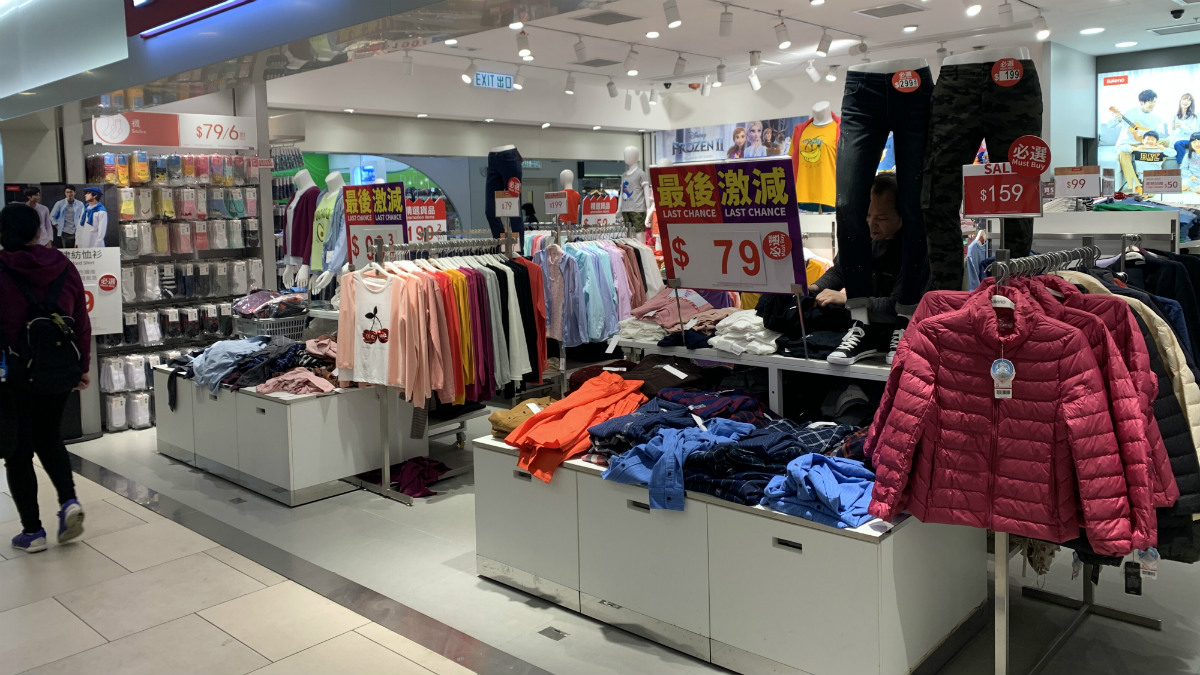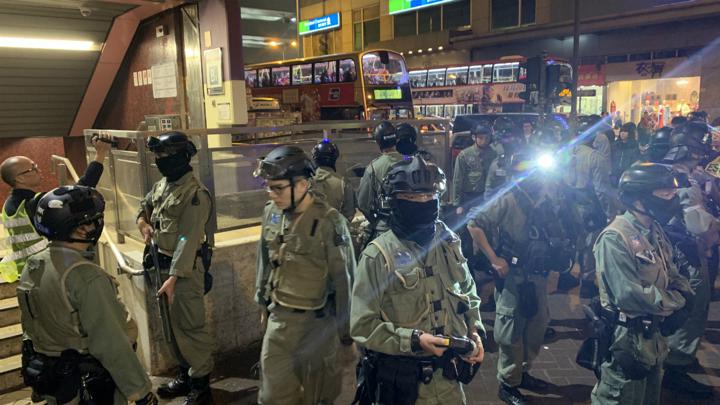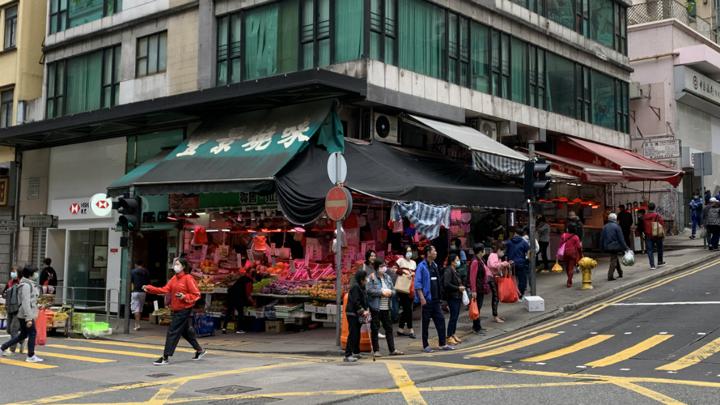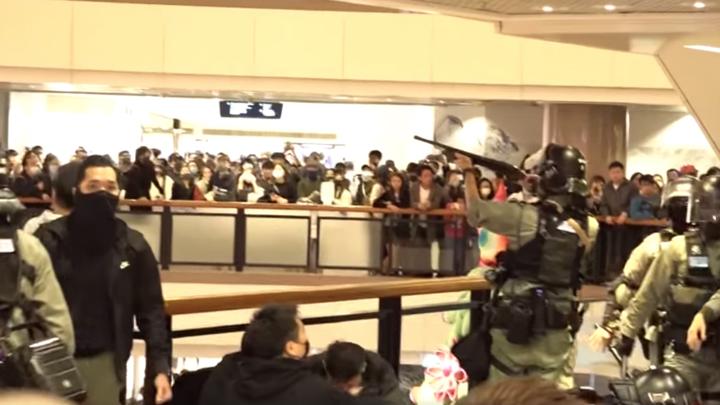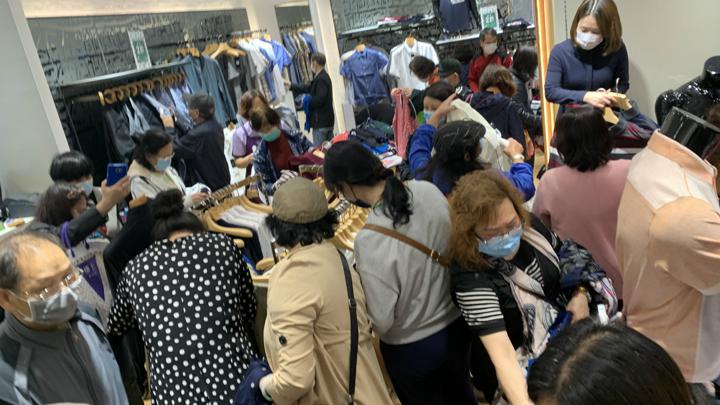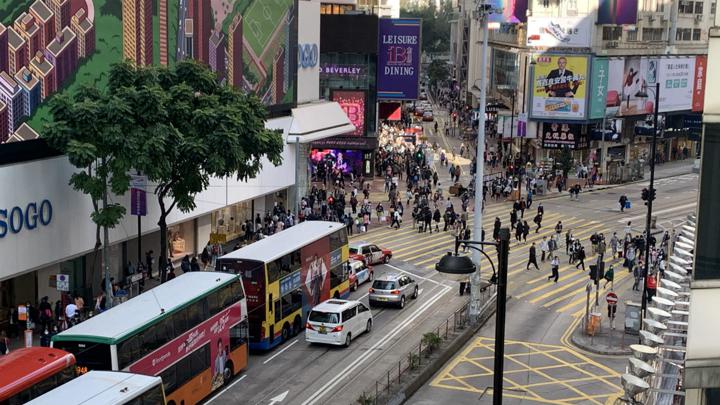Hong Kong retailers expect to suffer further weakening consumption markets for at least several more months due to the Covid-19 epidemic and a global market slump.
And the recent double economic hit comes on the heels of the street protests that crippled the city during the second half of last year.
Giordano International, a Hong Kong-listed apparel retailer, said on March 10 that its sales performance was dragged by “the Sino-US trade dispute, the unseasonably warm winter and the social events in Hong Kong.”
It said its revenue decreased 11.9% to HK$4.85 billion (US$624 million) for the year ending December 31 from 2018. Its net profit fell 52% to HK$230 million from HK$480 for the period.
The Covid-19 outbreak’s proximity to the traditional Lunar New Year buying spree exacerbated its negative impact on the company’s annual performance, said Peter Lai Kwok-kuen, chairman and chief executive of Giordano. The company expected that its business will be significantly hit by the epidemic in the first quarter of this year.
Crocodile Garments, another apparel retailer, said on February 19 that it expected to record a net loss between HK$130 million and HK$180 million for the six months ending January 31, compared with a net profit of HK$41.6 million for the same period of last year. The company said the decline was due to the substantial losses arising from the revaluation of its investment properties and the worsening performance of the garment business.
Since last June, there have been more than 1,400 anti-extradition protests in Hong Kong. Protesters called for an independent inquiry into police misconduct and the implementation of universal suffrage. Standoffs between police and protesters could be seen everywhere in the city. Some shops were vandalised while others were forced to close during police operations.
-
![]()
Many retailers were affected by police operations. Photo: Asia Times
Pro-democracy protesters started a campaign called “yellow economic circle” to avoid spending in some pro-government shops and restaurants while mainlanders also avoided coming to Hong Kong, which Beijing said was politically influenced by foreign powers.
Retail sales in Hong Kong fell 21.4% in January from a year ago, according to the Census and Statistics Department. Sales of jewelry, watches and luxury goods slumped 41.6% while sales of apparels decreased 28.9% for the period. Sales of food and beverages were down 6.8%. From late January, retailers have been further affected by the Covid-19 epidemic.
-
![]()
Food sellers are less affected by the epidemic than other retailers. Photo: Asia Times
Lifestyle International Holdings, which owns and operates Sogo Department Store in Causeway Bay, said on March 12 that its sales declined 11.9% to HK$4.85 billion in 2019 from a year ago. Excluding the interest and investment gains, the company’s operating profit decreased 18.2% to HK$1.63 billion from HK$2 billion for the period.
Although it is difficult to estimate how much longer the situation will persist, the recent virus problems in the past few weeks have already had a severe impact on the local economy and the unemployment rate is set to rise in the coming months, said Lau Kam-shim, an executive director of Lifestyle.
The company said it takes a pessimistic view on the outlook for the retail market and believes that 2020 is set to be an extremely challenging year for Hong Kong.
-
![]()
Police in Harbour City on December 24, 2019 Photo: RTHK
Wharf Real Estate Investment, which owns and operates Harbour City in Tsim She Tsui and Times Square in Causeway Bay, said on March 5 that its turnover rent income component drastically dropped by 49% in the third quarter and 78% in the fourth quarter in 2019. Fourth quarter Harbour City retail rental income decreased by 12%.
Stephen Ng Tin-hoi, chairman and managing director of Wharf Real Estate, said the virus outbreak had steepened the drop in retail demand as there was almost no incoming travelers in the city. He said the occupancy rate at the company’s hotels in February could be less than 10% of the amount in the same period of last year, while revenue from these hotels could have dropped 95% during the month. He said Harbour City had provided some rent relief to its tenants so the company’s first quarter performance would be affected.
“The world will likely be preoccupied with the virus outbreak this quarter and next,” Wharf Real Estate said in a statement. “It is not simple to fathom the damages the virus will leave in its trail and the path to economic and community recovery.”
On March 11, the Census and Statistics Department released a survey on the business situation of small-and-medium-sized enterprises (SMEs). The current diffusion index on business receipts among SMEs fell sharply to 20.3 in February from 44.1 in January, as adversely affected by the virus outbreak resulting in across-the-board downturn in business activities. The current diffusion index was 16.6 for the retail and 13.1 for the restaurants sector.
A reading above 50 indicates that the business condition is generally favorable, whereas below 50 indicates otherwise. About 600 SMEs in Hong Kong participated in the survey.
Due to the sluggish consumption markets, some retail shops have begun their “summer sales” in March. Baleno shops are selling three T-shirts for HK$99, which is equivalent to a 50% discount, but it did not attract a lot of customers. A Crocodile shop in Tseung Kwan O, which plans to move to another location, successfully gathered a crowd only after it cut prices by 70-80% for all its products.
-
![]()
A Crocodile shop in Tseung Kwan O Photo: Asia Times
-
![]()
More shoppers were seen on the streets in Causeway Bay from March. Photo: Asia Times
Although more people started showing up on the streets and in shopping malls from March, economists warned that the recent decline in the Hong Kong stock markets caused by the crash in the US markets and oil prices created a “negative wealth effect” and would further add pressure to the consumer market in Hong Kong. Over the past month, the Hang Seng Index has fallen 13.3% to close at 24,032 points on March 13.
“When stock or asset prices are going down, people feel that their wealth is shrinking and will have less mood to spend,” said Samuel Tse Ka-hei, an economist of DBS Bank Hong Kong. People would reduce their spending if they lost their jobs or became insecure about their income, Tse said.
He said Hong Kong retailers are facing a bigger challenge now than during the severe acute respiratory syndrome outbreak in 2003. He said sales would not improve in the coming few months and might see a 25% year-on-year decrease in 2020.




